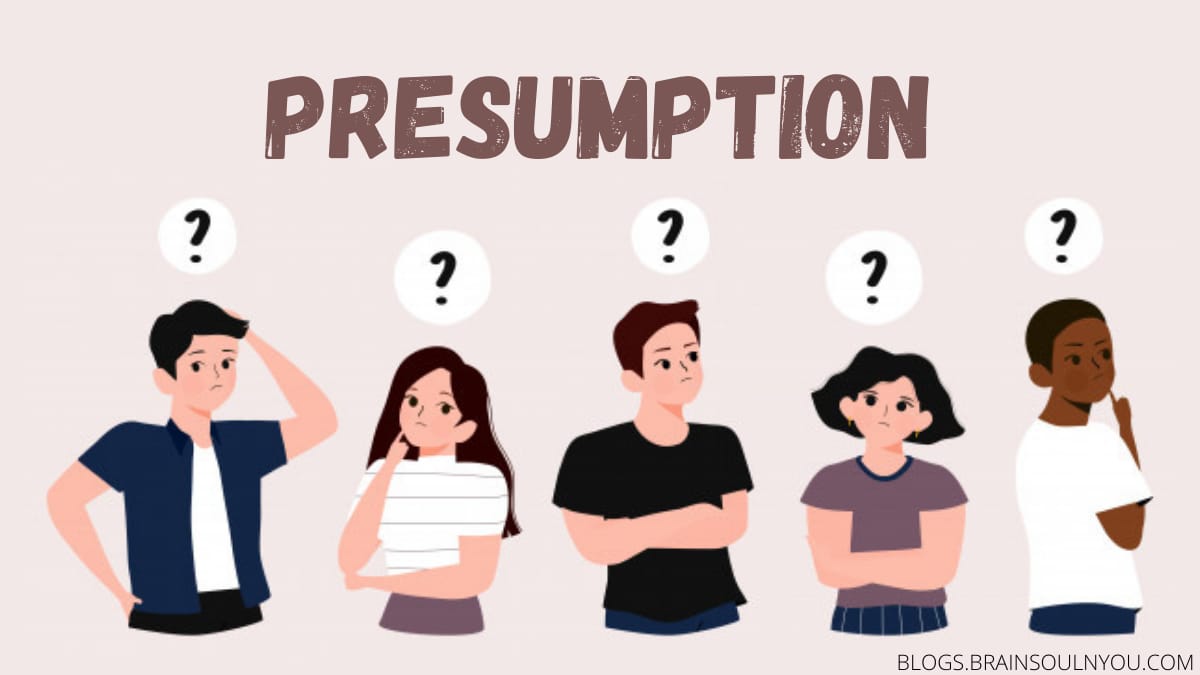The presumption, often considered a silent culprit, is a significant cause behind various relationship issues. In the intricate web of human connections, assumptions, and preconceived notions can stealthily weave a tapestry of misunderstandings, miscommunications, and conflicts. This intricate dance with presumption can lead to strained relationships, as individuals may find themselves navigating uncharted emotional territories fueled by assumptions rather than clear communication.
Understanding how presumption operates as a source of relationship issues is crucial in fostering healthier connections and building bridges of mutual understanding. In this exploration, we delve into the dynamics of presumption, its origins, and its profound impact on the fabric of interpersonal relationships.
There is no single cause of relationship issues. Many factors can play a part. But I noticed one thing, that also plays an essential part in many relationship issues.
What is Presumption?
The presumption is a term that refers to forming a belief or making an assumption without having conclusive evidence or proof. It involves making a judgment or drawing a conclusion based on limited information or personal biases. Presumptions can help make quick decisions or fill in gaps in knowledge, but they can also be misleading or inaccurate if not based on solid evidence.
It’s important to recognize that presumptions are not necessarily true or accurate and should be subject to further investigation or validation. In critical thinking and decision-making, it is advisable to question and challenge presumptions to ensure that conclusions are based on reliable evidence and sound reasoning.
How Presumptions Cause Relationship Issues?
The presumption is often considered a potential cause of relationship issues. When individuals make assumptions or jump to conclusions without sufficient evidence or open communication, it can lead to misunderstandings, conflicts, and strained relationships.
As I mentioned people generally assume in any situation. No matter what happens, you always keep thinking about something. Your mind never remains empty. But your mind assumes more without any facts and it assumes more negatively. For example, if you called someone and he disconnected your call or did not pick up your call. Then many questions start coming to your mind. Like why did he disconnect the call? Or is he angry with me? or is he ignoring me or many more questions?
Presumptions in relationships can arise when one person assumes the thoughts, feelings, or intentions of the other without seeking clarification or validation. This can lead to misinterpretations, resentment, and a communication breakdown.
For example, if one partner presumes that the other is being unfaithful based on a minor behavior or misunderstanding, it can create mistrust and damage the relationship. Similarly, presuming negative intentions or motives without discussing them openly can lead to resentment and emotional distance.

There are many other examples also by which you may also relate. Like, if your partner or friend reads your WhatsApp or Facebook message but does not reply or vice versa. What happens? He or she makes presumptions or you make presumptions. Maybe he is busy with someone else, he does not care for me anymore, and many more things.
Your mind is more intelligent. When you ask any question to yourself, your mind will give the answer. Like, maybe he must have felt bad about anything of mine, or maybe he doesn’t like me anymore, etc. Your mind makes up the whole Presumption. This problem is not only with some. This is with many of us. We make this Presumption a false reality. This false reality creates the problem. Because you start believing more in your presumptions than the person about whom you are thinking.
Why Your Mind Makes Presumption?
The human mind is prone to making presumptions or jumping to conclusions due to various cognitive and psychological factors. Here are a few reasons why the mind tends to make presumptions:
Cognitive biases: Our minds are influenced by cognitive biases, which are systematic patterns of thinking that can distort our perception and judgment. Biases such as confirmation bias (favoring information that confirms our existing beliefs) or availability bias (relying on readily available information) can contribute to making presumptions based on limited or biased information.
Incomplete information: When faced with incomplete or ambiguous information, our minds naturally try to fill in the gaps by making assumptions. It’s a way for our brains to make sense of the world and reduce uncertainty, even if those assumptions may not be accurate.
Past experiences: Our past experiences and learned associations shape our perception of the present and future. If we have had negative experiences or encounters in the past, we may be more likely to presume negative outcomes or intentions in similar situations.
Cognitive shortcuts: Our minds use cognitive shortcuts or heuristics to make quick judgments and decisions. While these shortcuts can be efficient, they can also lead to snap judgments and presumptions based on limited information.
Emotional factors: Emotions can influence our thinking and lead to biased judgments. Strong emotions like fear, anxiety, or past traumas can color our perceptions and lead to presumptions driven by emotional reactions rather than logical analysis.
Social influences: Social and cultural factors can shape our thinking and influence the presumptions we make. Our beliefs, values, and societal norms can contribute to the formation of assumptions and stereotypes about others.
It’s important to recognize these tendencies in our thinking and be mindful of the potential biases and assumptions we may be making. Engaging in open-mindedness, seeking more information, practicing empathy, and fostering clear communication can help mitigate the negative effects of presumptions in our interactions and relationships.

The nature of the mind is never to remain calm. There’s always something going on in your mind. It always keeps thinking and assuming. For those who assume more, it becomes their habit to assume anything. The mind has two functions: The Conscious mind which monitors present events and the Subconscious mind which contains Behaviour Patterns and works accordingly.
The conscious mind is the logical mind and the subconscious mind is the illogical mind. If you are making the presumption a false reality that is because of the subconscious mind. Your subconscious mind does not differentiate between fake and real. When you assume too deeply and assume again and again your subconscious mind starts believing it is real.
Expectations are Presumptions
When you expect anything from anyone you actually assume. You feel sad when someone doesn’t live up to your expectations. Your expectations are only your presumptions. So, do not expect anything from anyone. This is key to your happiness.
How to Overcome this Cause of Relationship Issues?
To avoid the negative impact of presumption in relationships, it is important to cultivate open and honest communication. This involves actively listening to each other, expressing concerns or doubts directly, and seeking clarification when assumptions are made. By addressing presumptions early on and promoting understanding and empathy, couples can build stronger and healthier relationships.
Presumptions are sometimes categorized into two types: presumptions without basic facts, and presumptions with basic facts. Presumptions with basic facts are not the wrong thing. However, presumptions without basic facts create the main problem. Many times it happens that without confirming with the person, you start believing that your presumptions are true. Still, there are no facts. You fight with the person and break your relationship.

So, one thing you can do is confirm with the person so that whatever you are assuming gets clarity. You should trust your partner. Think positive in any situation. If you make any presumption make it positive and it should be with basic facts. Never overthink and never assume. If you still assume, communicate and clear the issue. Do one more thing, whenever you make such presumptions observe your thoughts and stop them immediately.
I am sure you will also agree with me and relate to that. After that observe yourself whenever you make presumptions and try the solution that I shared. Share this article with those who make such presumptions.
Some General Strategies
Overcoming relationship issues can be a complex process, but here are some general strategies that can help:
Communication: Open and honest communication is the key to resolving conflicts and addressing relationship issues. Create a safe space for both partners to express their thoughts, feelings, and concerns. Listen actively and try to understand each other’s point of view without criticizing.
Empathy and understanding: Practice empathy by putting yourself in your partner’s shoes and trying to understand their emotions and experiences. Validate their feelings and show compassion. This can help foster understanding and connection.
Conflict resolution skills: Learn healthy ways to resolve conflicts and disagreements. Focus on finding win-win solutions rather than trying to “win” the argument. Use constructive communication techniques such as active listening, compromising, and finding common ground.
Seek professional help: If you’re unable to resolve the issues on your own, consider seeking the help of a couples therapist or relationship counselor. They can provide guidance, facilitate communication, and offer tools and strategies tailored to your specific situation.
Self-Reflection: Take time to reflect on your thoughts, feelings, and behaviors within the relationship. Consider any patterns or habits that may be contributing to the issues. Self-awareness can help you identify areas for personal growth and make positive changes.
Prioritize quality time together: Make an effort to spend quality time with your partner and engage in activities that you both enjoy. This can strengthen the emotional bond and create positive experiences.
Promote Trust and Forgiveness: If trust is broken, it is important to rebuild it. Work on rebuilding trust through open and honest communication, consistency, and following through on your commitments. Practice forgiveness and let go of past hurts to move forward.
Take care of yourself: Remember to prioritize self-care and individual well-being. This includes attending to your physical, emotional, and mental health. When you take care of yourself, you’re better equipped to contribute positively to the relationship.
It’s important to note that every relationship is unique, and overcoming relationship issues may require patience, effort, and a willingness to work together. It’s also important to assess whether the relationship is healthy and meets your needs. If the relationship becomes consistently unhealthy or abusive, it may be necessary to consider ending it for your own well-being.
Frequently Asked Questions (FAQs)
- What is the impact of presumptions on relationships?
Presumptions can significantly impact relationships by causing misunderstandings, conflicts, and strained communication. When individuals make assumptions without evidence or open communication, it can lead to mistrust, resentment, and damage to the relationship. - How can presumptions lead to communication breakdown in relationships?
Presumptions often arise when one person assumes the thoughts, feelings, or intentions of the other without seeking clarification. This can result in misinterpretations, negative assumptions, and a communication breakdown. Open and honest communication is crucial to address and prevent such issues. - Why does the mind make presumptions in relationships?
The human mind tends to make presumptions due to cognitive biases, incomplete information, past experiences, cognitive shortcuts, emotional factors, and social influences. These factors can lead to snap judgments and assumptions that may not be accurate. Recognizing and addressing these tendencies is important for healthy relationships. - How can expectations contribute to relationship issues?
Expectations often involve presumptions about how others should behave or respond. When expectations are not met, it can lead to disappointment, sadness, and conflict. Learning to manage and communicate expectations effectively is essential for preventing relationship issues. - What are some general strategies to overcome relationship issues caused by presumptions?
General strategies include open communication, empathy, conflict resolution skills, seeking professional help if needed, self-reflection, prioritizing quality time together, promoting trust and forgiveness, and taking care of individual well-being. These strategies can contribute to resolving conflicts and fostering a healthier relationship.
Read more blogs on Self-Confidence vs Narcissism, Importance of Emotional Intelligence, Kintsugi: The art of making Broken Beautiful,
For Relationship Counselling contact Brain Soul & You.
Love,
Saurabh Goel
Saurabh Goel
He is the Founder and CEO of the Training and Counselling Company ‘Brain Soul & You’. He is an NLP Wellness Coach, Life Coach, Brain analyst, and Trainer for Education, Corporate, and Entrepreneurship. For more than 7 years, he delivered presentations on entrepreneurship, mind programming, and motivation. He did his B.tech in IT and later choose to be a successful psychologist. He is helping people in various ways through his counseling and training sessions.



One can come to love not by finding the perfect person, but by seeing an imperfect person perfectly..